Macro Environmental Influence: Private, Public, and Voluntary Sectors
VerifiedAdded on 2023/01/04
|16
|4479
|99
Report
AI Summary
This report provides a comprehensive analysis of macro environmental influences on businesses, focusing on the private, public, and voluntary sectors. It begins with an introduction to business and its environment, followed by a discussion on the differences between private, public, and voluntary organizations, including their sizes, scopes, and examples such as Ryanair, NHS, and Shelter. The report delves into the relationship between various organizational functions like finance, marketing, HR, and R&D, highlighting their interdependencies. Part 2 presents a PESTLE analysis framework to examine the external environment, including political, economic, technological, legal, socio-cultural, and environmental factors. The report also explores the interrelation between strengths, weaknesses, and external macro factors, concluding with a summary of the key findings and references.
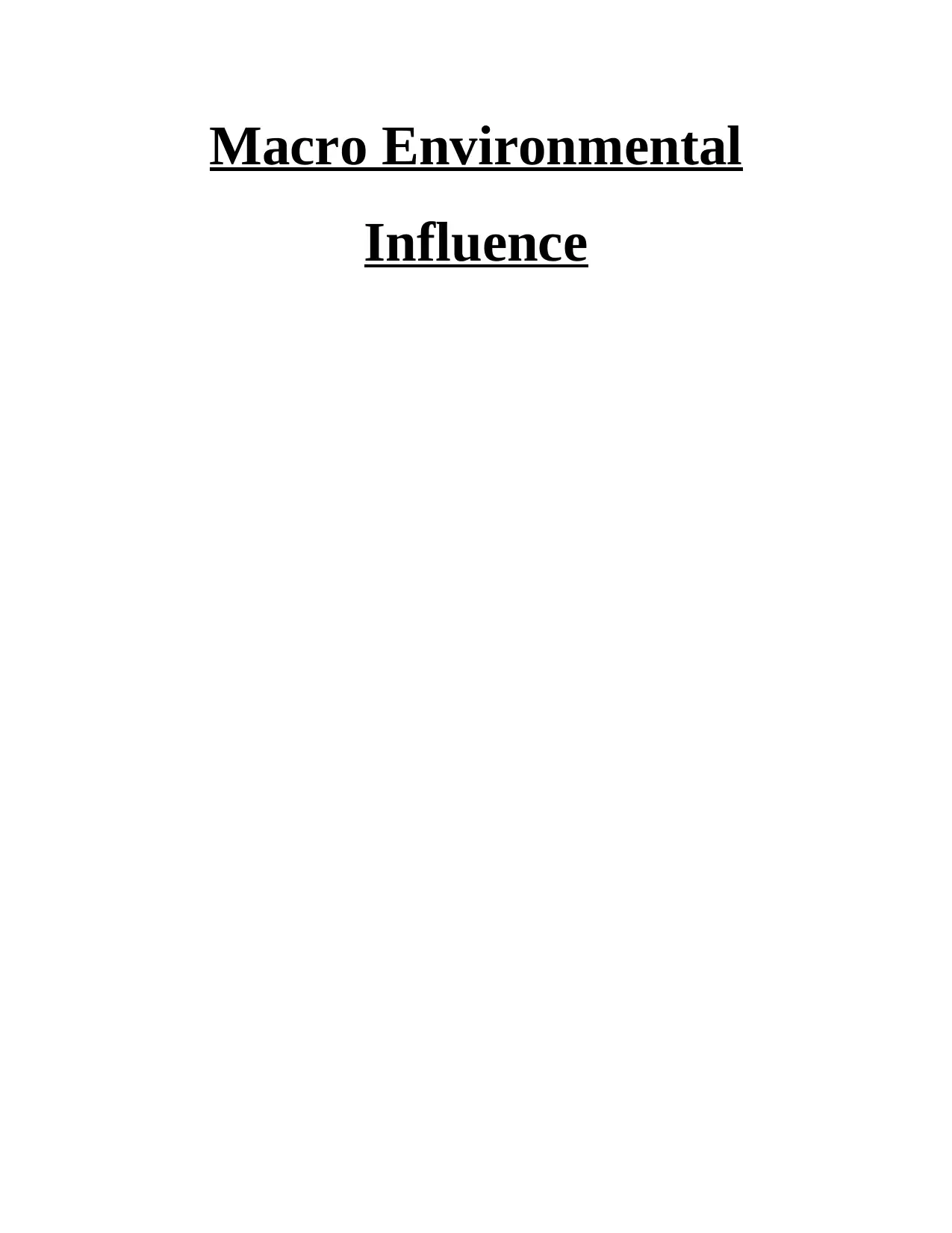
Macro Environmental
Influence
Influence
Paraphrase This Document
Need a fresh take? Get an instant paraphrase of this document with our AI Paraphraser
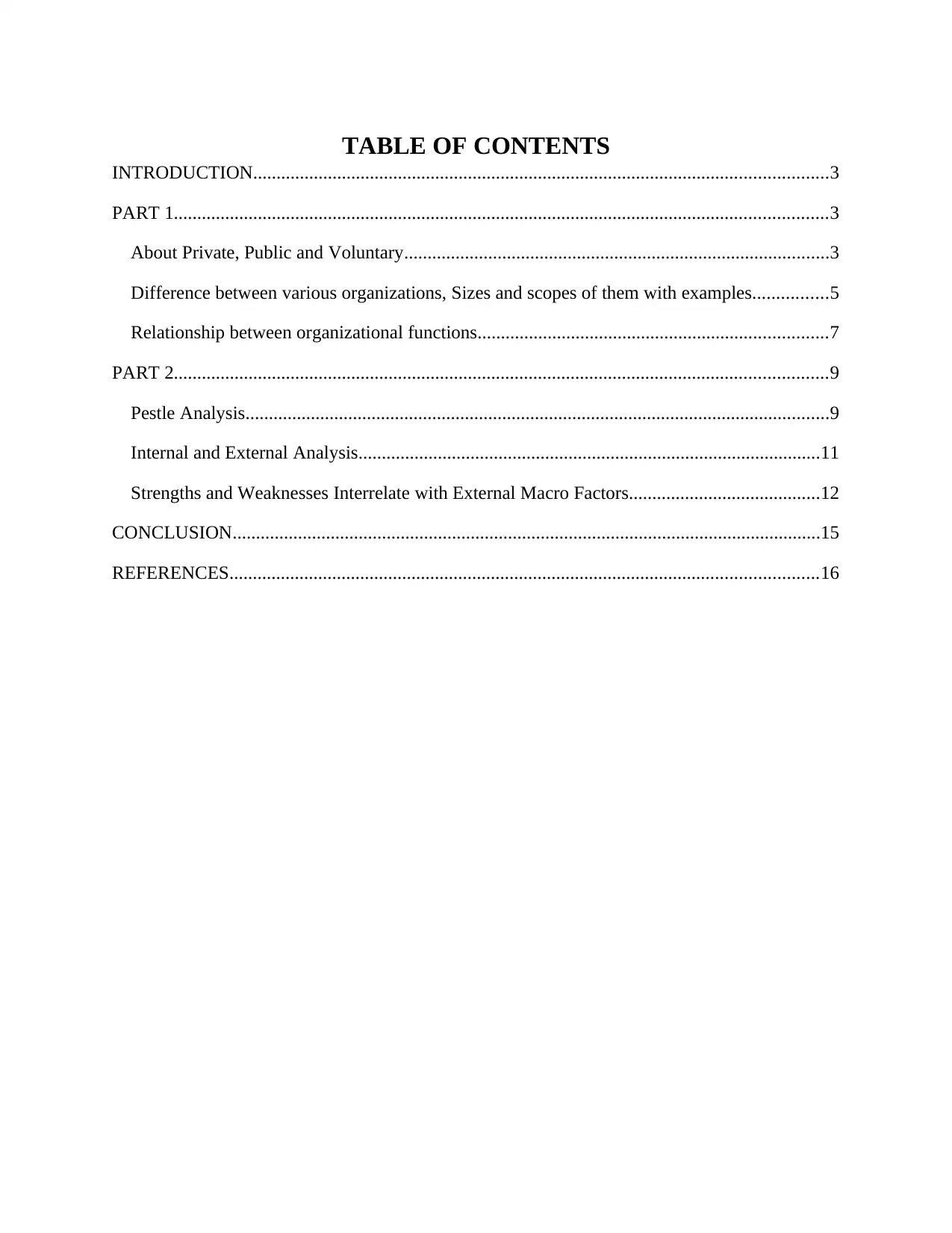
TABLE OF CONTENTS
INTRODUCTION...........................................................................................................................3
PART 1............................................................................................................................................3
About Private, Public and Voluntary...........................................................................................3
Difference between various organizations, Sizes and scopes of them with examples................5
Relationship between organizational functions...........................................................................7
PART 2............................................................................................................................................9
Pestle Analysis.............................................................................................................................9
Internal and External Analysis...................................................................................................11
Strengths and Weaknesses Interrelate with External Macro Factors.........................................12
CONCLUSION..............................................................................................................................15
REFERENCES..............................................................................................................................16
INTRODUCTION...........................................................................................................................3
PART 1............................................................................................................................................3
About Private, Public and Voluntary...........................................................................................3
Difference between various organizations, Sizes and scopes of them with examples................5
Relationship between organizational functions...........................................................................7
PART 2............................................................................................................................................9
Pestle Analysis.............................................................................................................................9
Internal and External Analysis...................................................................................................11
Strengths and Weaknesses Interrelate with External Macro Factors.........................................12
CONCLUSION..............................................................................................................................15
REFERENCES..............................................................................................................................16
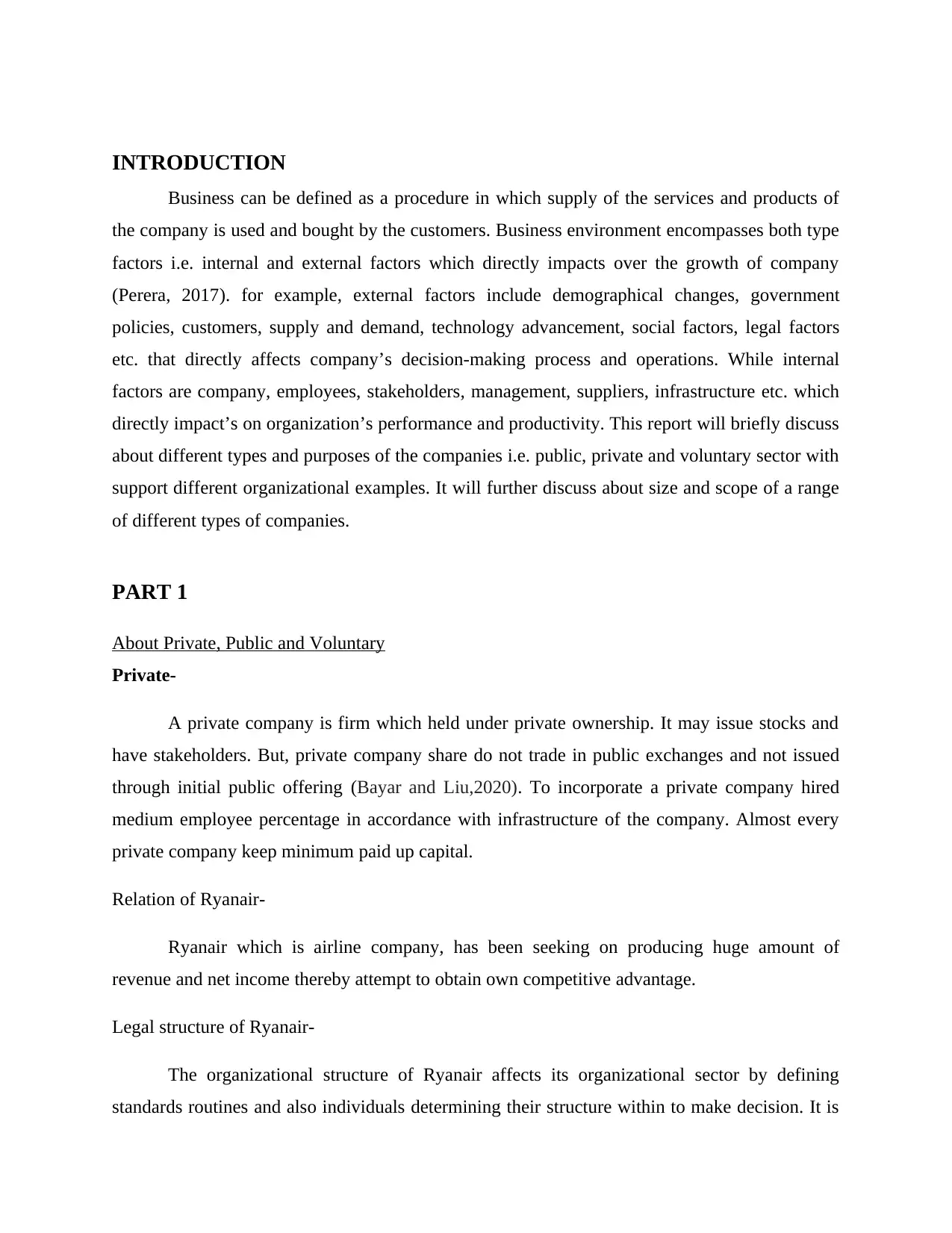
INTRODUCTION
Business can be defined as a procedure in which supply of the services and products of
the company is used and bought by the customers. Business environment encompasses both type
factors i.e. internal and external factors which directly impacts over the growth of company
(Perera, 2017). for example, external factors include demographical changes, government
policies, customers, supply and demand, technology advancement, social factors, legal factors
etc. that directly affects company’s decision-making process and operations. While internal
factors are company, employees, stakeholders, management, suppliers, infrastructure etc. which
directly impact’s on organization’s performance and productivity. This report will briefly discuss
about different types and purposes of the companies i.e. public, private and voluntary sector with
support different organizational examples. It will further discuss about size and scope of a range
of different types of companies.
PART 1
About Private, Public and Voluntary
Private-
A private company is firm which held under private ownership. It may issue stocks and
have stakeholders. But, private company share do not trade in public exchanges and not issued
through initial public offering (Bayar and Liu,2020). To incorporate a private company hired
medium employee percentage in accordance with infrastructure of the company. Almost every
private company keep minimum paid up capital.
Relation of Ryanair-
Ryanair which is airline company, has been seeking on producing huge amount of
revenue and net income thereby attempt to obtain own competitive advantage.
Legal structure of Ryanair-
The organizational structure of Ryanair affects its organizational sector by defining
standards routines and also individuals determining their structure within to make decision. It is
Business can be defined as a procedure in which supply of the services and products of
the company is used and bought by the customers. Business environment encompasses both type
factors i.e. internal and external factors which directly impacts over the growth of company
(Perera, 2017). for example, external factors include demographical changes, government
policies, customers, supply and demand, technology advancement, social factors, legal factors
etc. that directly affects company’s decision-making process and operations. While internal
factors are company, employees, stakeholders, management, suppliers, infrastructure etc. which
directly impact’s on organization’s performance and productivity. This report will briefly discuss
about different types and purposes of the companies i.e. public, private and voluntary sector with
support different organizational examples. It will further discuss about size and scope of a range
of different types of companies.
PART 1
About Private, Public and Voluntary
Private-
A private company is firm which held under private ownership. It may issue stocks and
have stakeholders. But, private company share do not trade in public exchanges and not issued
through initial public offering (Bayar and Liu,2020). To incorporate a private company hired
medium employee percentage in accordance with infrastructure of the company. Almost every
private company keep minimum paid up capital.
Relation of Ryanair-
Ryanair which is airline company, has been seeking on producing huge amount of
revenue and net income thereby attempt to obtain own competitive advantage.
Legal structure of Ryanair-
The organizational structure of Ryanair affects its organizational sector by defining
standards routines and also individuals determining their structure within to make decision. It is
⊘ This is a preview!⊘
Do you want full access?
Subscribe today to unlock all pages.

Trusted by 1+ million students worldwide
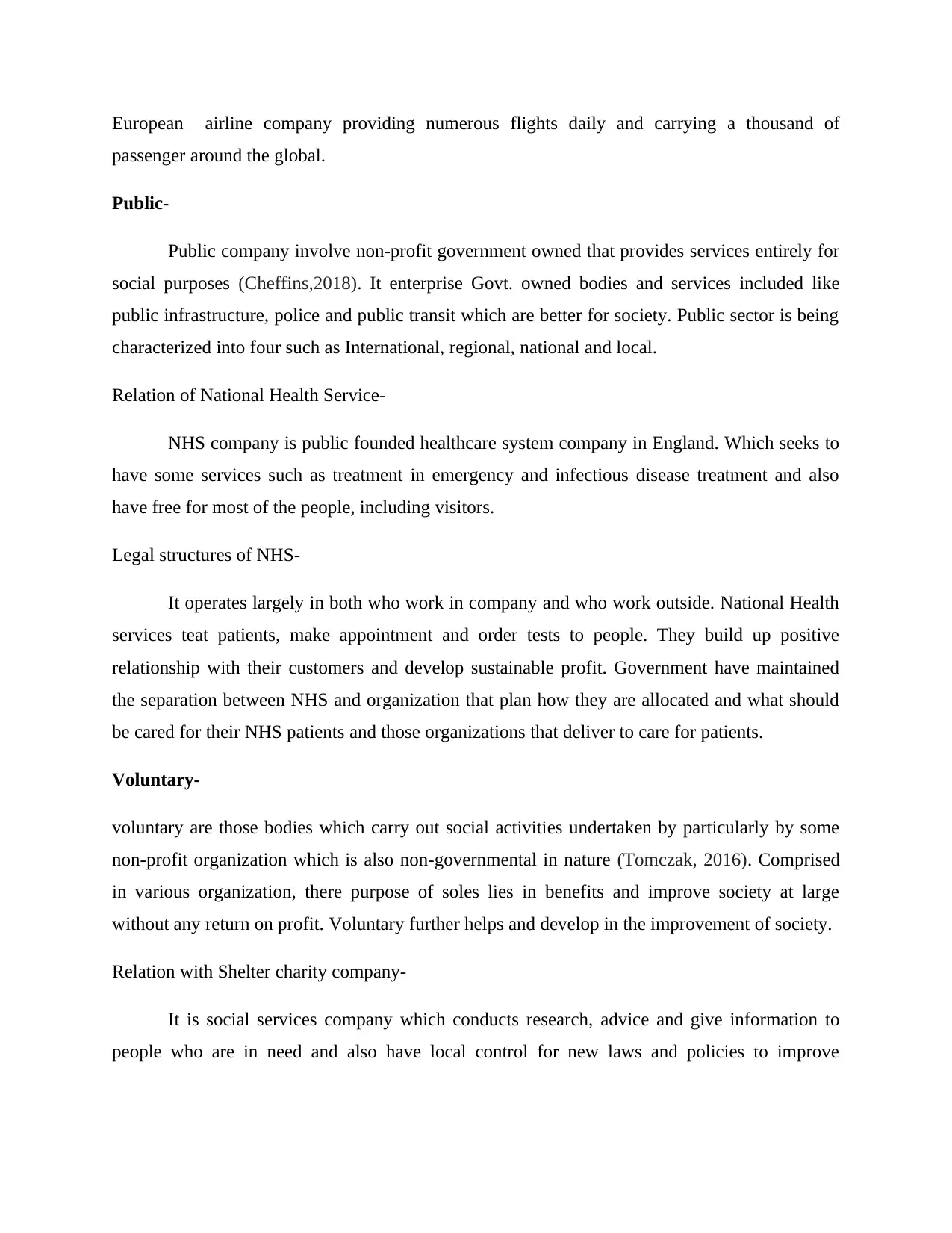
European airline company providing numerous flights daily and carrying a thousand of
passenger around the global.
Public-
Public company involve non-profit government owned that provides services entirely for
social purposes (Cheffins,2018). It enterprise Govt. owned bodies and services included like
public infrastructure, police and public transit which are better for society. Public sector is being
characterized into four such as International, regional, national and local.
Relation of National Health Service-
NHS company is public founded healthcare system company in England. Which seeks to
have some services such as treatment in emergency and infectious disease treatment and also
have free for most of the people, including visitors.
Legal structures of NHS-
It operates largely in both who work in company and who work outside. National Health
services teat patients, make appointment and order tests to people. They build up positive
relationship with their customers and develop sustainable profit. Government have maintained
the separation between NHS and organization that plan how they are allocated and what should
be cared for their NHS patients and those organizations that deliver to care for patients.
Voluntary-
voluntary are those bodies which carry out social activities undertaken by particularly by some
non-profit organization which is also non-governmental in nature (Tomczak, 2016). Comprised
in various organization, there purpose of soles lies in benefits and improve society at large
without any return on profit. Voluntary further helps and develop in the improvement of society.
Relation with Shelter charity company-
It is social services company which conducts research, advice and give information to
people who are in need and also have local control for new laws and policies to improve
passenger around the global.
Public-
Public company involve non-profit government owned that provides services entirely for
social purposes (Cheffins,2018). It enterprise Govt. owned bodies and services included like
public infrastructure, police and public transit which are better for society. Public sector is being
characterized into four such as International, regional, national and local.
Relation of National Health Service-
NHS company is public founded healthcare system company in England. Which seeks to
have some services such as treatment in emergency and infectious disease treatment and also
have free for most of the people, including visitors.
Legal structures of NHS-
It operates largely in both who work in company and who work outside. National Health
services teat patients, make appointment and order tests to people. They build up positive
relationship with their customers and develop sustainable profit. Government have maintained
the separation between NHS and organization that plan how they are allocated and what should
be cared for their NHS patients and those organizations that deliver to care for patients.
Voluntary-
voluntary are those bodies which carry out social activities undertaken by particularly by some
non-profit organization which is also non-governmental in nature (Tomczak, 2016). Comprised
in various organization, there purpose of soles lies in benefits and improve society at large
without any return on profit. Voluntary further helps and develop in the improvement of society.
Relation with Shelter charity company-
It is social services company which conducts research, advice and give information to
people who are in need and also have local control for new laws and policies to improve
Paraphrase This Document
Need a fresh take? Get an instant paraphrase of this document with our AI Paraphraser
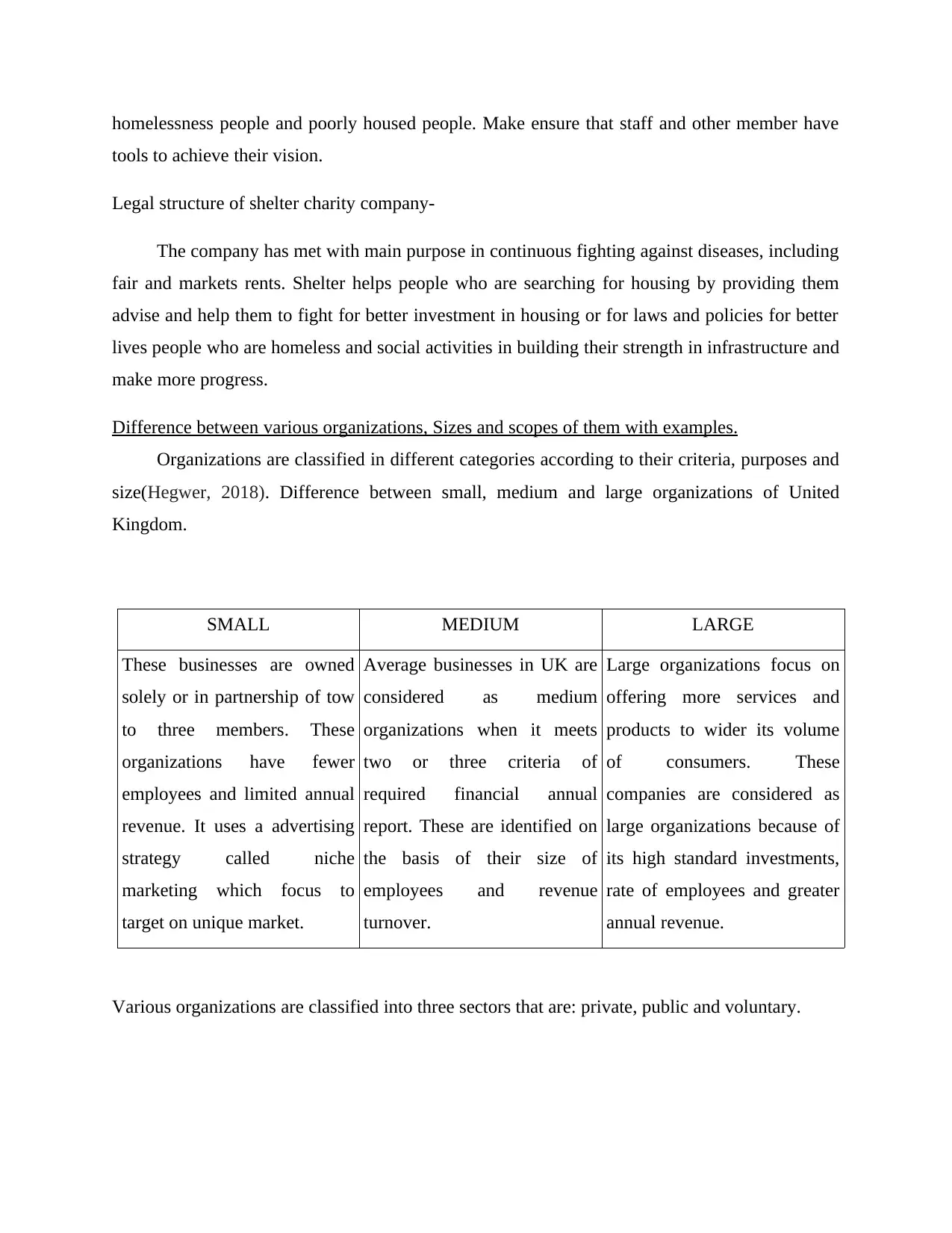
homelessness people and poorly housed people. Make ensure that staff and other member have
tools to achieve their vision.
Legal structure of shelter charity company-
The company has met with main purpose in continuous fighting against diseases, including
fair and markets rents. Shelter helps people who are searching for housing by providing them
advise and help them to fight for better investment in housing or for laws and policies for better
lives people who are homeless and social activities in building their strength in infrastructure and
make more progress.
Difference between various organizations, Sizes and scopes of them with examples.
Organizations are classified in different categories according to their criteria, purposes and
size(Hegwer, 2018). Difference between small, medium and large organizations of United
Kingdom.
SMALL MEDIUM LARGE
These businesses are owned
solely or in partnership of tow
to three members. These
organizations have fewer
employees and limited annual
revenue. It uses a advertising
strategy called niche
marketing which focus to
target on unique market.
Average businesses in UK are
considered as medium
organizations when it meets
two or three criteria of
required financial annual
report. These are identified on
the basis of their size of
employees and revenue
turnover.
Large organizations focus on
offering more services and
products to wider its volume
of consumers. These
companies are considered as
large organizations because of
its high standard investments,
rate of employees and greater
annual revenue.
Various organizations are classified into three sectors that are: private, public and voluntary.
tools to achieve their vision.
Legal structure of shelter charity company-
The company has met with main purpose in continuous fighting against diseases, including
fair and markets rents. Shelter helps people who are searching for housing by providing them
advise and help them to fight for better investment in housing or for laws and policies for better
lives people who are homeless and social activities in building their strength in infrastructure and
make more progress.
Difference between various organizations, Sizes and scopes of them with examples.
Organizations are classified in different categories according to their criteria, purposes and
size(Hegwer, 2018). Difference between small, medium and large organizations of United
Kingdom.
SMALL MEDIUM LARGE
These businesses are owned
solely or in partnership of tow
to three members. These
organizations have fewer
employees and limited annual
revenue. It uses a advertising
strategy called niche
marketing which focus to
target on unique market.
Average businesses in UK are
considered as medium
organizations when it meets
two or three criteria of
required financial annual
report. These are identified on
the basis of their size of
employees and revenue
turnover.
Large organizations focus on
offering more services and
products to wider its volume
of consumers. These
companies are considered as
large organizations because of
its high standard investments,
rate of employees and greater
annual revenue.
Various organizations are classified into three sectors that are: private, public and voluntary.
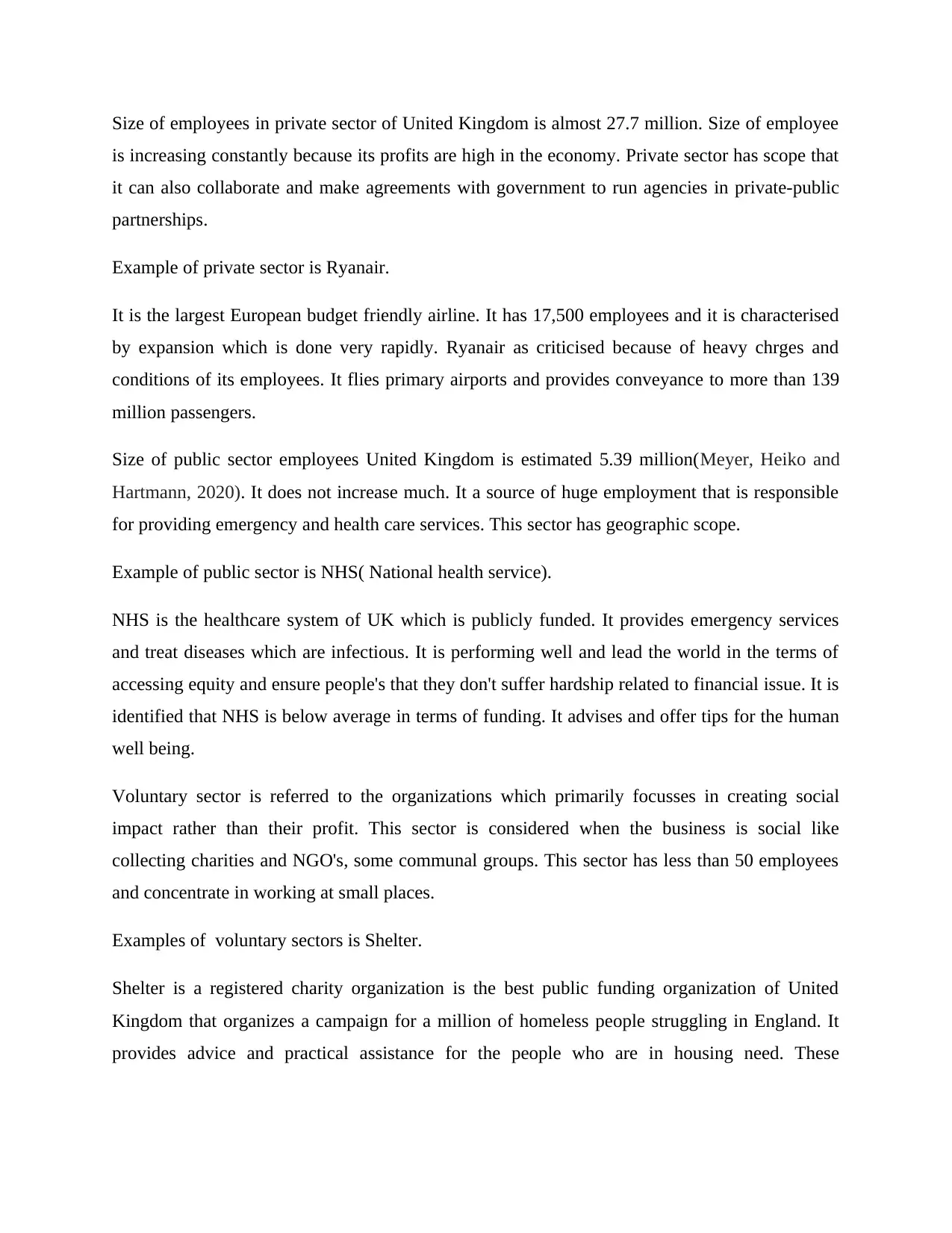
Size of employees in private sector of United Kingdom is almost 27.7 million. Size of employee
is increasing constantly because its profits are high in the economy. Private sector has scope that
it can also collaborate and make agreements with government to run agencies in private-public
partnerships.
Example of private sector is Ryanair.
It is the largest European budget friendly airline. It has 17,500 employees and it is characterised
by expansion which is done very rapidly. Ryanair as criticised because of heavy chrges and
conditions of its employees. It flies primary airports and provides conveyance to more than 139
million passengers.
Size of public sector employees United Kingdom is estimated 5.39 million(Meyer, Heiko and
Hartmann, 2020). It does not increase much. It a source of huge employment that is responsible
for providing emergency and health care services. This sector has geographic scope.
Example of public sector is NHS( National health service).
NHS is the healthcare system of UK which is publicly funded. It provides emergency services
and treat diseases which are infectious. It is performing well and lead the world in the terms of
accessing equity and ensure people's that they don't suffer hardship related to financial issue. It is
identified that NHS is below average in terms of funding. It advises and offer tips for the human
well being.
Voluntary sector is referred to the organizations which primarily focusses in creating social
impact rather than their profit. This sector is considered when the business is social like
collecting charities and NGO's, some communal groups. This sector has less than 50 employees
and concentrate in working at small places.
Examples of voluntary sectors is Shelter.
Shelter is a registered charity organization is the best public funding organization of United
Kingdom that organizes a campaign for a million of homeless people struggling in England. It
provides advice and practical assistance for the people who are in housing need. These
is increasing constantly because its profits are high in the economy. Private sector has scope that
it can also collaborate and make agreements with government to run agencies in private-public
partnerships.
Example of private sector is Ryanair.
It is the largest European budget friendly airline. It has 17,500 employees and it is characterised
by expansion which is done very rapidly. Ryanair as criticised because of heavy chrges and
conditions of its employees. It flies primary airports and provides conveyance to more than 139
million passengers.
Size of public sector employees United Kingdom is estimated 5.39 million(Meyer, Heiko and
Hartmann, 2020). It does not increase much. It a source of huge employment that is responsible
for providing emergency and health care services. This sector has geographic scope.
Example of public sector is NHS( National health service).
NHS is the healthcare system of UK which is publicly funded. It provides emergency services
and treat diseases which are infectious. It is performing well and lead the world in the terms of
accessing equity and ensure people's that they don't suffer hardship related to financial issue. It is
identified that NHS is below average in terms of funding. It advises and offer tips for the human
well being.
Voluntary sector is referred to the organizations which primarily focusses in creating social
impact rather than their profit. This sector is considered when the business is social like
collecting charities and NGO's, some communal groups. This sector has less than 50 employees
and concentrate in working at small places.
Examples of voluntary sectors is Shelter.
Shelter is a registered charity organization is the best public funding organization of United
Kingdom that organizes a campaign for a million of homeless people struggling in England. It
provides advice and practical assistance for the people who are in housing need. These
⊘ This is a preview!⊘
Do you want full access?
Subscribe today to unlock all pages.

Trusted by 1+ million students worldwide
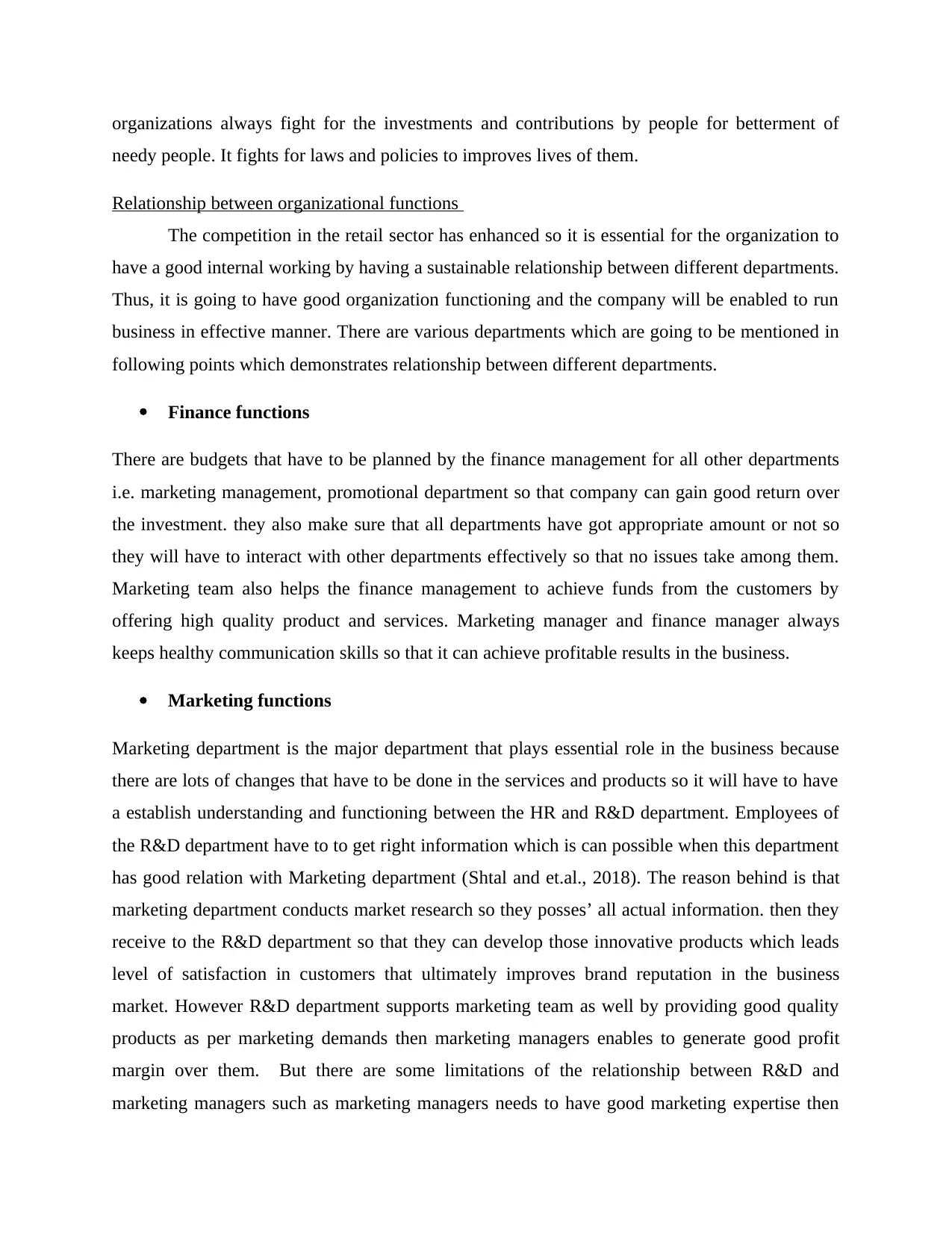
organizations always fight for the investments and contributions by people for betterment of
needy people. It fights for laws and policies to improves lives of them.
Relationship between organizational functions
The competition in the retail sector has enhanced so it is essential for the organization to
have a good internal working by having a sustainable relationship between different departments.
Thus, it is going to have good organization functioning and the company will be enabled to run
business in effective manner. There are various departments which are going to be mentioned in
following points which demonstrates relationship between different departments.
Finance functions
There are budgets that have to be planned by the finance management for all other departments
i.e. marketing management, promotional department so that company can gain good return over
the investment. they also make sure that all departments have got appropriate amount or not so
they will have to interact with other departments effectively so that no issues take among them.
Marketing team also helps the finance management to achieve funds from the customers by
offering high quality product and services. Marketing manager and finance manager always
keeps healthy communication skills so that it can achieve profitable results in the business.
Marketing functions
Marketing department is the major department that plays essential role in the business because
there are lots of changes that have to be done in the services and products so it will have to have
a establish understanding and functioning between the HR and R&D department. Employees of
the R&D department have to to get right information which is can possible when this department
has good relation with Marketing department (Shtal and et.al., 2018). The reason behind is that
marketing department conducts market research so they posses’ all actual information. then they
receive to the R&D department so that they can develop those innovative products which leads
level of satisfaction in customers that ultimately improves brand reputation in the business
market. However R&D department supports marketing team as well by providing good quality
products as per marketing demands then marketing managers enables to generate good profit
margin over them. But there are some limitations of the relationship between R&D and
marketing managers such as marketing managers needs to have good marketing expertise then
needy people. It fights for laws and policies to improves lives of them.
Relationship between organizational functions
The competition in the retail sector has enhanced so it is essential for the organization to
have a good internal working by having a sustainable relationship between different departments.
Thus, it is going to have good organization functioning and the company will be enabled to run
business in effective manner. There are various departments which are going to be mentioned in
following points which demonstrates relationship between different departments.
Finance functions
There are budgets that have to be planned by the finance management for all other departments
i.e. marketing management, promotional department so that company can gain good return over
the investment. they also make sure that all departments have got appropriate amount or not so
they will have to interact with other departments effectively so that no issues take among them.
Marketing team also helps the finance management to achieve funds from the customers by
offering high quality product and services. Marketing manager and finance manager always
keeps healthy communication skills so that it can achieve profitable results in the business.
Marketing functions
Marketing department is the major department that plays essential role in the business because
there are lots of changes that have to be done in the services and products so it will have to have
a establish understanding and functioning between the HR and R&D department. Employees of
the R&D department have to to get right information which is can possible when this department
has good relation with Marketing department (Shtal and et.al., 2018). The reason behind is that
marketing department conducts market research so they posses’ all actual information. then they
receive to the R&D department so that they can develop those innovative products which leads
level of satisfaction in customers that ultimately improves brand reputation in the business
market. However R&D department supports marketing team as well by providing good quality
products as per marketing demands then marketing managers enables to generate good profit
margin over them. But there are some limitations of the relationship between R&D and
marketing managers such as marketing managers needs to have good marketing expertise then
Paraphrase This Document
Need a fresh take? Get an instant paraphrase of this document with our AI Paraphraser
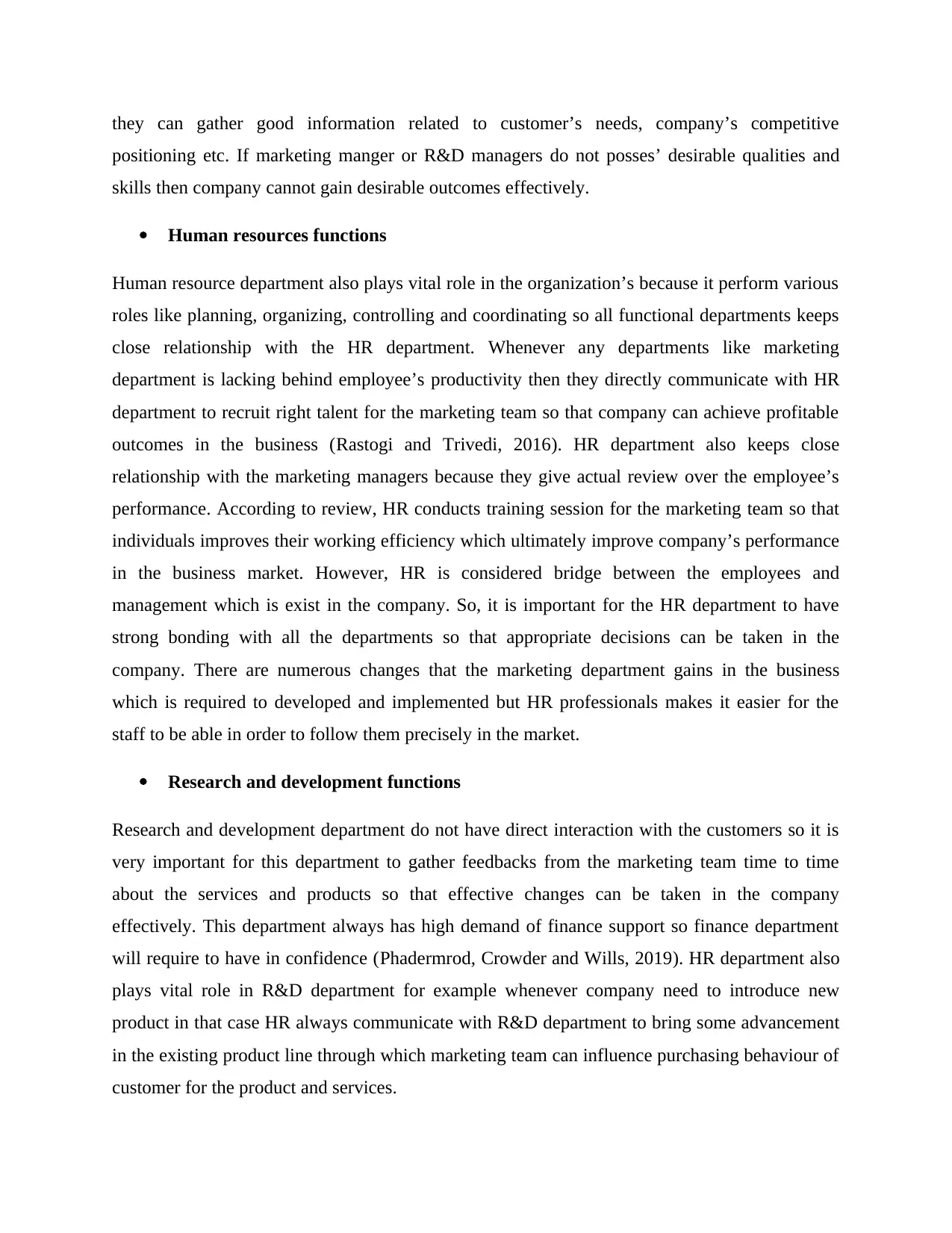
they can gather good information related to customer’s needs, company’s competitive
positioning etc. If marketing manger or R&D managers do not posses’ desirable qualities and
skills then company cannot gain desirable outcomes effectively.
Human resources functions
Human resource department also plays vital role in the organization’s because it perform various
roles like planning, organizing, controlling and coordinating so all functional departments keeps
close relationship with the HR department. Whenever any departments like marketing
department is lacking behind employee’s productivity then they directly communicate with HR
department to recruit right talent for the marketing team so that company can achieve profitable
outcomes in the business (Rastogi and Trivedi, 2016). HR department also keeps close
relationship with the marketing managers because they give actual review over the employee’s
performance. According to review, HR conducts training session for the marketing team so that
individuals improves their working efficiency which ultimately improve company’s performance
in the business market. However, HR is considered bridge between the employees and
management which is exist in the company. So, it is important for the HR department to have
strong bonding with all the departments so that appropriate decisions can be taken in the
company. There are numerous changes that the marketing department gains in the business
which is required to developed and implemented but HR professionals makes it easier for the
staff to be able in order to follow them precisely in the market.
Research and development functions
Research and development department do not have direct interaction with the customers so it is
very important for this department to gather feedbacks from the marketing team time to time
about the services and products so that effective changes can be taken in the company
effectively. This department always has high demand of finance support so finance department
will require to have in confidence (Phadermrod, Crowder and Wills, 2019). HR department also
plays vital role in R&D department for example whenever company need to introduce new
product in that case HR always communicate with R&D department to bring some advancement
in the existing product line through which marketing team can influence purchasing behaviour of
customer for the product and services.
positioning etc. If marketing manger or R&D managers do not posses’ desirable qualities and
skills then company cannot gain desirable outcomes effectively.
Human resources functions
Human resource department also plays vital role in the organization’s because it perform various
roles like planning, organizing, controlling and coordinating so all functional departments keeps
close relationship with the HR department. Whenever any departments like marketing
department is lacking behind employee’s productivity then they directly communicate with HR
department to recruit right talent for the marketing team so that company can achieve profitable
outcomes in the business (Rastogi and Trivedi, 2016). HR department also keeps close
relationship with the marketing managers because they give actual review over the employee’s
performance. According to review, HR conducts training session for the marketing team so that
individuals improves their working efficiency which ultimately improve company’s performance
in the business market. However, HR is considered bridge between the employees and
management which is exist in the company. So, it is important for the HR department to have
strong bonding with all the departments so that appropriate decisions can be taken in the
company. There are numerous changes that the marketing department gains in the business
which is required to developed and implemented but HR professionals makes it easier for the
staff to be able in order to follow them precisely in the market.
Research and development functions
Research and development department do not have direct interaction with the customers so it is
very important for this department to gather feedbacks from the marketing team time to time
about the services and products so that effective changes can be taken in the company
effectively. This department always has high demand of finance support so finance department
will require to have in confidence (Phadermrod, Crowder and Wills, 2019). HR department also
plays vital role in R&D department for example whenever company need to introduce new
product in that case HR always communicate with R&D department to bring some advancement
in the existing product line through which marketing team can influence purchasing behaviour of
customer for the product and services.
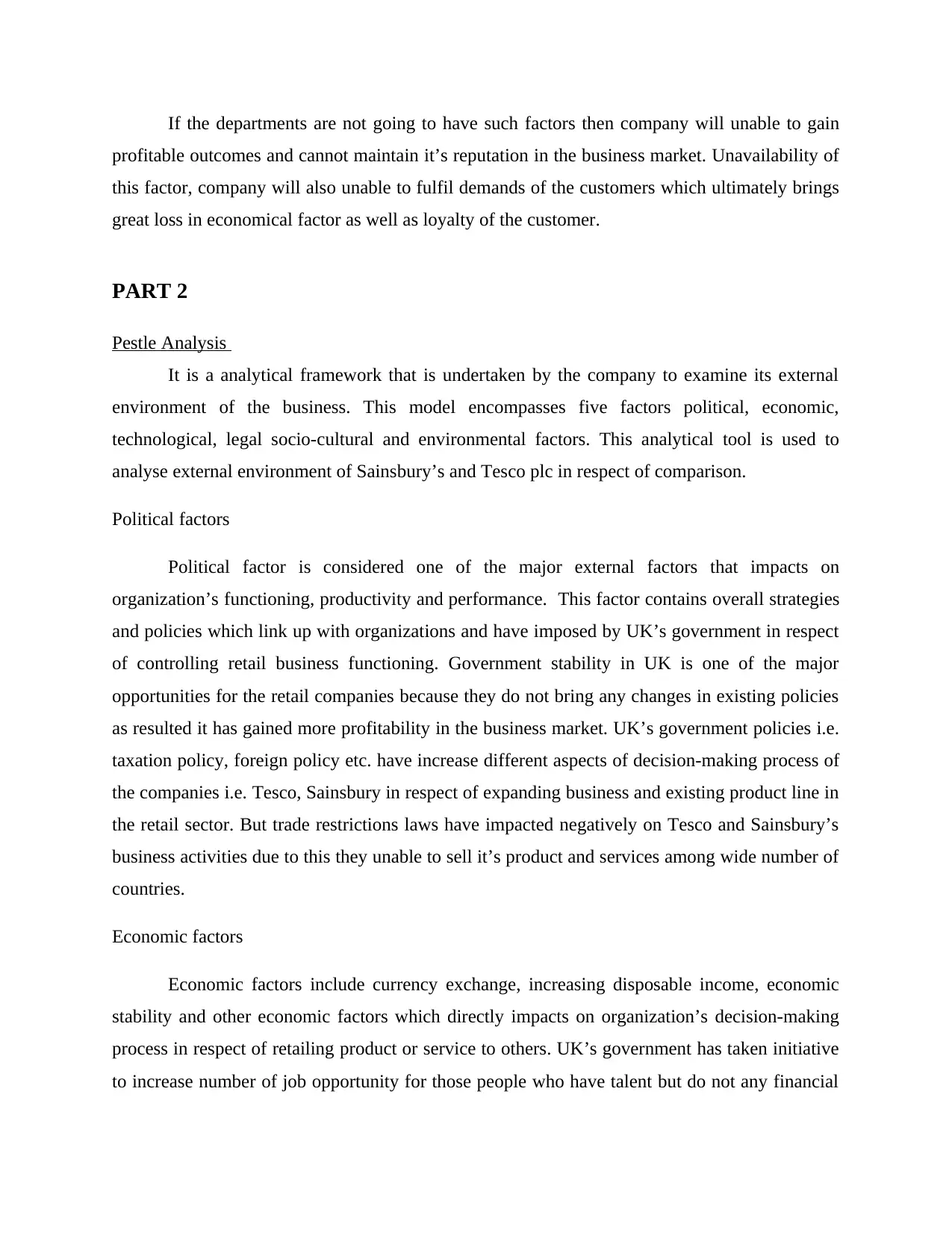
If the departments are not going to have such factors then company will unable to gain
profitable outcomes and cannot maintain it’s reputation in the business market. Unavailability of
this factor, company will also unable to fulfil demands of the customers which ultimately brings
great loss in economical factor as well as loyalty of the customer.
PART 2
Pestle Analysis
It is a analytical framework that is undertaken by the company to examine its external
environment of the business. This model encompasses five factors political, economic,
technological, legal socio-cultural and environmental factors. This analytical tool is used to
analyse external environment of Sainsbury’s and Tesco plc in respect of comparison.
Political factors
Political factor is considered one of the major external factors that impacts on
organization’s functioning, productivity and performance. This factor contains overall strategies
and policies which link up with organizations and have imposed by UK’s government in respect
of controlling retail business functioning. Government stability in UK is one of the major
opportunities for the retail companies because they do not bring any changes in existing policies
as resulted it has gained more profitability in the business market. UK’s government policies i.e.
taxation policy, foreign policy etc. have increase different aspects of decision-making process of
the companies i.e. Tesco, Sainsbury in respect of expanding business and existing product line in
the retail sector. But trade restrictions laws have impacted negatively on Tesco and Sainsbury’s
business activities due to this they unable to sell it’s product and services among wide number of
countries.
Economic factors
Economic factors include currency exchange, increasing disposable income, economic
stability and other economic factors which directly impacts on organization’s decision-making
process in respect of retailing product or service to others. UK’s government has taken initiative
to increase number of job opportunity for those people who have talent but do not any financial
profitable outcomes and cannot maintain it’s reputation in the business market. Unavailability of
this factor, company will also unable to fulfil demands of the customers which ultimately brings
great loss in economical factor as well as loyalty of the customer.
PART 2
Pestle Analysis
It is a analytical framework that is undertaken by the company to examine its external
environment of the business. This model encompasses five factors political, economic,
technological, legal socio-cultural and environmental factors. This analytical tool is used to
analyse external environment of Sainsbury’s and Tesco plc in respect of comparison.
Political factors
Political factor is considered one of the major external factors that impacts on
organization’s functioning, productivity and performance. This factor contains overall strategies
and policies which link up with organizations and have imposed by UK’s government in respect
of controlling retail business functioning. Government stability in UK is one of the major
opportunities for the retail companies because they do not bring any changes in existing policies
as resulted it has gained more profitability in the business market. UK’s government policies i.e.
taxation policy, foreign policy etc. have increase different aspects of decision-making process of
the companies i.e. Tesco, Sainsbury in respect of expanding business and existing product line in
the retail sector. But trade restrictions laws have impacted negatively on Tesco and Sainsbury’s
business activities due to this they unable to sell it’s product and services among wide number of
countries.
Economic factors
Economic factors include currency exchange, increasing disposable income, economic
stability and other economic factors which directly impacts on organization’s decision-making
process in respect of retailing product or service to others. UK’s government has taken initiative
to increase number of job opportunity for those people who have talent but do not any financial
⊘ This is a preview!⊘
Do you want full access?
Subscribe today to unlock all pages.

Trusted by 1+ million students worldwide
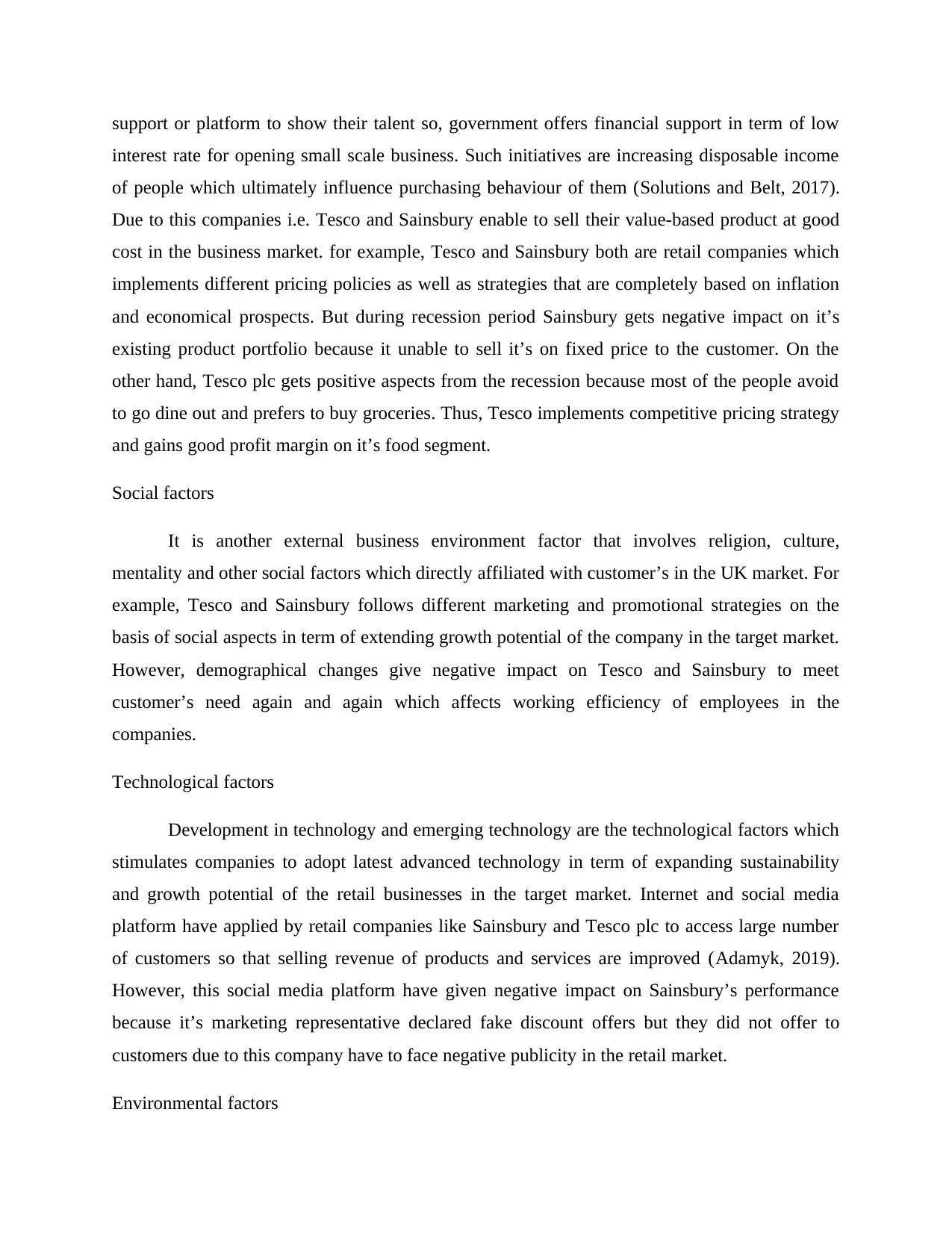
support or platform to show their talent so, government offers financial support in term of low
interest rate for opening small scale business. Such initiatives are increasing disposable income
of people which ultimately influence purchasing behaviour of them (Solutions and Belt, 2017).
Due to this companies i.e. Tesco and Sainsbury enable to sell their value-based product at good
cost in the business market. for example, Tesco and Sainsbury both are retail companies which
implements different pricing policies as well as strategies that are completely based on inflation
and economical prospects. But during recession period Sainsbury gets negative impact on it’s
existing product portfolio because it unable to sell it’s on fixed price to the customer. On the
other hand, Tesco plc gets positive aspects from the recession because most of the people avoid
to go dine out and prefers to buy groceries. Thus, Tesco implements competitive pricing strategy
and gains good profit margin on it’s food segment.
Social factors
It is another external business environment factor that involves religion, culture,
mentality and other social factors which directly affiliated with customer’s in the UK market. For
example, Tesco and Sainsbury follows different marketing and promotional strategies on the
basis of social aspects in term of extending growth potential of the company in the target market.
However, demographical changes give negative impact on Tesco and Sainsbury to meet
customer’s need again and again which affects working efficiency of employees in the
companies.
Technological factors
Development in technology and emerging technology are the technological factors which
stimulates companies to adopt latest advanced technology in term of expanding sustainability
and growth potential of the retail businesses in the target market. Internet and social media
platform have applied by retail companies like Sainsbury and Tesco plc to access large number
of customers so that selling revenue of products and services are improved (Adamyk, 2019).
However, this social media platform have given negative impact on Sainsbury’s performance
because it’s marketing representative declared fake discount offers but they did not offer to
customers due to this company have to face negative publicity in the retail market.
Environmental factors
interest rate for opening small scale business. Such initiatives are increasing disposable income
of people which ultimately influence purchasing behaviour of them (Solutions and Belt, 2017).
Due to this companies i.e. Tesco and Sainsbury enable to sell their value-based product at good
cost in the business market. for example, Tesco and Sainsbury both are retail companies which
implements different pricing policies as well as strategies that are completely based on inflation
and economical prospects. But during recession period Sainsbury gets negative impact on it’s
existing product portfolio because it unable to sell it’s on fixed price to the customer. On the
other hand, Tesco plc gets positive aspects from the recession because most of the people avoid
to go dine out and prefers to buy groceries. Thus, Tesco implements competitive pricing strategy
and gains good profit margin on it’s food segment.
Social factors
It is another external business environment factor that involves religion, culture,
mentality and other social factors which directly affiliated with customer’s in the UK market. For
example, Tesco and Sainsbury follows different marketing and promotional strategies on the
basis of social aspects in term of extending growth potential of the company in the target market.
However, demographical changes give negative impact on Tesco and Sainsbury to meet
customer’s need again and again which affects working efficiency of employees in the
companies.
Technological factors
Development in technology and emerging technology are the technological factors which
stimulates companies to adopt latest advanced technology in term of expanding sustainability
and growth potential of the retail businesses in the target market. Internet and social media
platform have applied by retail companies like Sainsbury and Tesco plc to access large number
of customers so that selling revenue of products and services are improved (Adamyk, 2019).
However, this social media platform have given negative impact on Sainsbury’s performance
because it’s marketing representative declared fake discount offers but they did not offer to
customers due to this company have to face negative publicity in the retail market.
Environmental factors
Paraphrase This Document
Need a fresh take? Get an instant paraphrase of this document with our AI Paraphraser
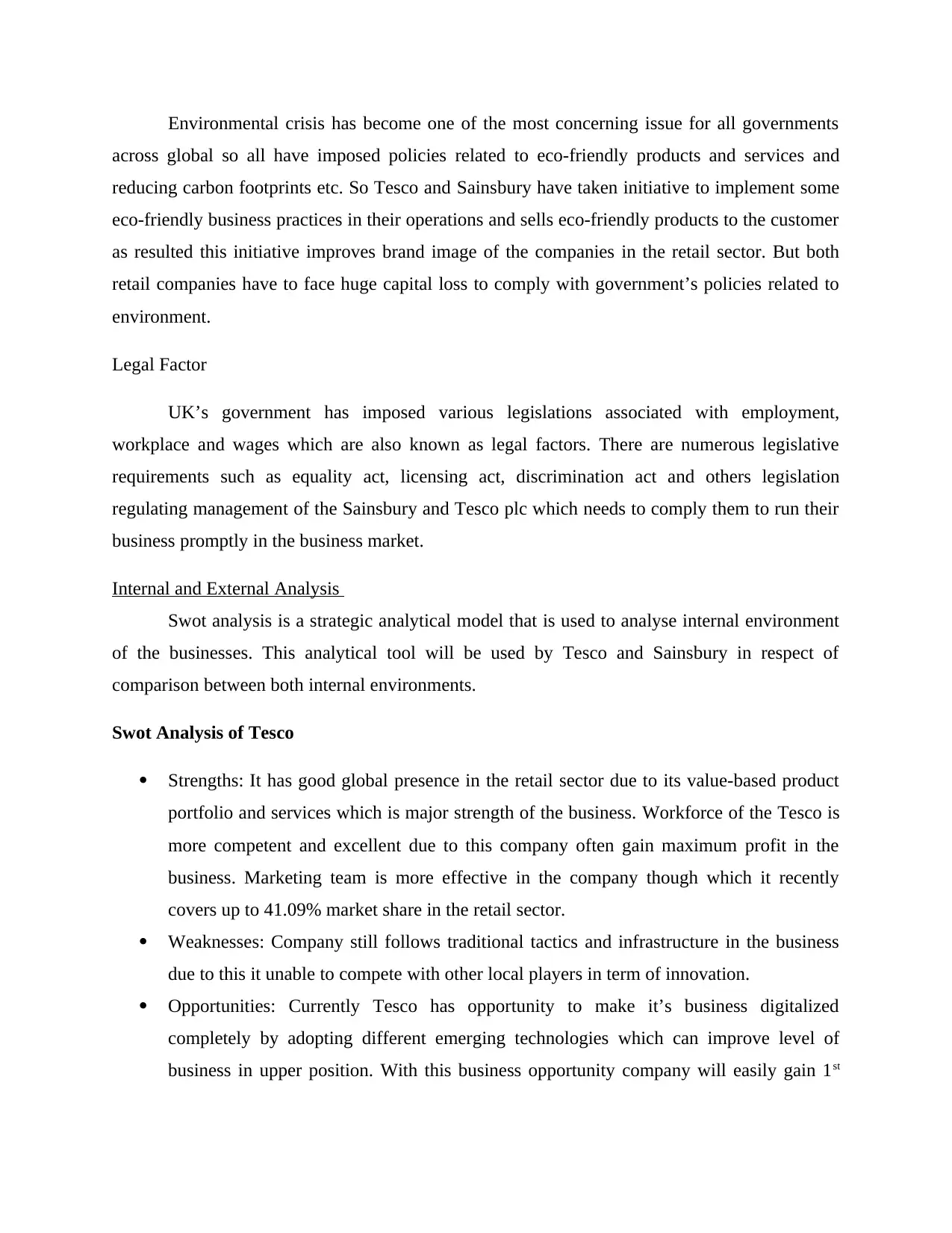
Environmental crisis has become one of the most concerning issue for all governments
across global so all have imposed policies related to eco-friendly products and services and
reducing carbon footprints etc. So Tesco and Sainsbury have taken initiative to implement some
eco-friendly business practices in their operations and sells eco-friendly products to the customer
as resulted this initiative improves brand image of the companies in the retail sector. But both
retail companies have to face huge capital loss to comply with government’s policies related to
environment.
Legal Factor
UK’s government has imposed various legislations associated with employment,
workplace and wages which are also known as legal factors. There are numerous legislative
requirements such as equality act, licensing act, discrimination act and others legislation
regulating management of the Sainsbury and Tesco plc which needs to comply them to run their
business promptly in the business market.
Internal and External Analysis
Swot analysis is a strategic analytical model that is used to analyse internal environment
of the businesses. This analytical tool will be used by Tesco and Sainsbury in respect of
comparison between both internal environments.
Swot Analysis of Tesco
Strengths: It has good global presence in the retail sector due to its value-based product
portfolio and services which is major strength of the business. Workforce of the Tesco is
more competent and excellent due to this company often gain maximum profit in the
business. Marketing team is more effective in the company though which it recently
covers up to 41.09% market share in the retail sector.
Weaknesses: Company still follows traditional tactics and infrastructure in the business
due to this it unable to compete with other local players in term of innovation.
Opportunities: Currently Tesco has opportunity to make it’s business digitalized
completely by adopting different emerging technologies which can improve level of
business in upper position. With this business opportunity company will easily gain 1st
across global so all have imposed policies related to eco-friendly products and services and
reducing carbon footprints etc. So Tesco and Sainsbury have taken initiative to implement some
eco-friendly business practices in their operations and sells eco-friendly products to the customer
as resulted this initiative improves brand image of the companies in the retail sector. But both
retail companies have to face huge capital loss to comply with government’s policies related to
environment.
Legal Factor
UK’s government has imposed various legislations associated with employment,
workplace and wages which are also known as legal factors. There are numerous legislative
requirements such as equality act, licensing act, discrimination act and others legislation
regulating management of the Sainsbury and Tesco plc which needs to comply them to run their
business promptly in the business market.
Internal and External Analysis
Swot analysis is a strategic analytical model that is used to analyse internal environment
of the businesses. This analytical tool will be used by Tesco and Sainsbury in respect of
comparison between both internal environments.
Swot Analysis of Tesco
Strengths: It has good global presence in the retail sector due to its value-based product
portfolio and services which is major strength of the business. Workforce of the Tesco is
more competent and excellent due to this company often gain maximum profit in the
business. Marketing team is more effective in the company though which it recently
covers up to 41.09% market share in the retail sector.
Weaknesses: Company still follows traditional tactics and infrastructure in the business
due to this it unable to compete with other local players in term of innovation.
Opportunities: Currently Tesco has opportunity to make it’s business digitalized
completely by adopting different emerging technologies which can improve level of
business in upper position. With this business opportunity company will easily gain 1st
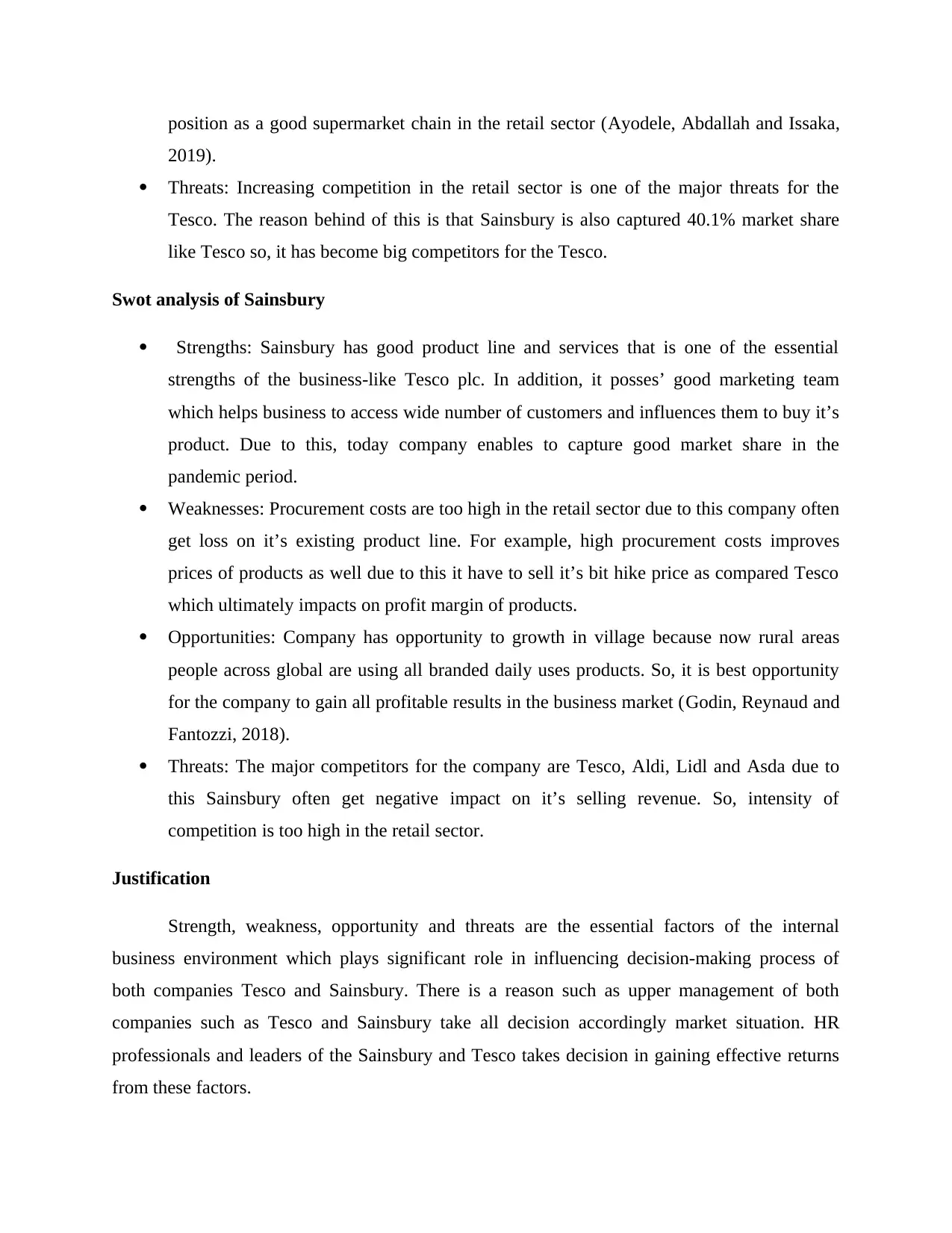
position as a good supermarket chain in the retail sector (Ayodele, Abdallah and Issaka,
2019).
Threats: Increasing competition in the retail sector is one of the major threats for the
Tesco. The reason behind of this is that Sainsbury is also captured 40.1% market share
like Tesco so, it has become big competitors for the Tesco.
Swot analysis of Sainsbury
Strengths: Sainsbury has good product line and services that is one of the essential
strengths of the business-like Tesco plc. In addition, it posses’ good marketing team
which helps business to access wide number of customers and influences them to buy it’s
product. Due to this, today company enables to capture good market share in the
pandemic period.
Weaknesses: Procurement costs are too high in the retail sector due to this company often
get loss on it’s existing product line. For example, high procurement costs improves
prices of products as well due to this it have to sell it’s bit hike price as compared Tesco
which ultimately impacts on profit margin of products.
Opportunities: Company has opportunity to growth in village because now rural areas
people across global are using all branded daily uses products. So, it is best opportunity
for the company to gain all profitable results in the business market (Godin, Reynaud and
Fantozzi, 2018).
Threats: The major competitors for the company are Tesco, Aldi, Lidl and Asda due to
this Sainsbury often get negative impact on it’s selling revenue. So, intensity of
competition is too high in the retail sector.
Justification
Strength, weakness, opportunity and threats are the essential factors of the internal
business environment which plays significant role in influencing decision-making process of
both companies Tesco and Sainsbury. There is a reason such as upper management of both
companies such as Tesco and Sainsbury take all decision accordingly market situation. HR
professionals and leaders of the Sainsbury and Tesco takes decision in gaining effective returns
from these factors.
2019).
Threats: Increasing competition in the retail sector is one of the major threats for the
Tesco. The reason behind of this is that Sainsbury is also captured 40.1% market share
like Tesco so, it has become big competitors for the Tesco.
Swot analysis of Sainsbury
Strengths: Sainsbury has good product line and services that is one of the essential
strengths of the business-like Tesco plc. In addition, it posses’ good marketing team
which helps business to access wide number of customers and influences them to buy it’s
product. Due to this, today company enables to capture good market share in the
pandemic period.
Weaknesses: Procurement costs are too high in the retail sector due to this company often
get loss on it’s existing product line. For example, high procurement costs improves
prices of products as well due to this it have to sell it’s bit hike price as compared Tesco
which ultimately impacts on profit margin of products.
Opportunities: Company has opportunity to growth in village because now rural areas
people across global are using all branded daily uses products. So, it is best opportunity
for the company to gain all profitable results in the business market (Godin, Reynaud and
Fantozzi, 2018).
Threats: The major competitors for the company are Tesco, Aldi, Lidl and Asda due to
this Sainsbury often get negative impact on it’s selling revenue. So, intensity of
competition is too high in the retail sector.
Justification
Strength, weakness, opportunity and threats are the essential factors of the internal
business environment which plays significant role in influencing decision-making process of
both companies Tesco and Sainsbury. There is a reason such as upper management of both
companies such as Tesco and Sainsbury take all decision accordingly market situation. HR
professionals and leaders of the Sainsbury and Tesco takes decision in gaining effective returns
from these factors.
⊘ This is a preview!⊘
Do you want full access?
Subscribe today to unlock all pages.

Trusted by 1+ million students worldwide
1 out of 16
Related Documents
Your All-in-One AI-Powered Toolkit for Academic Success.
+13062052269
info@desklib.com
Available 24*7 on WhatsApp / Email
![[object Object]](/_next/static/media/star-bottom.7253800d.svg)
Unlock your academic potential
Copyright © 2020–2026 A2Z Services. All Rights Reserved. Developed and managed by ZUCOL.





